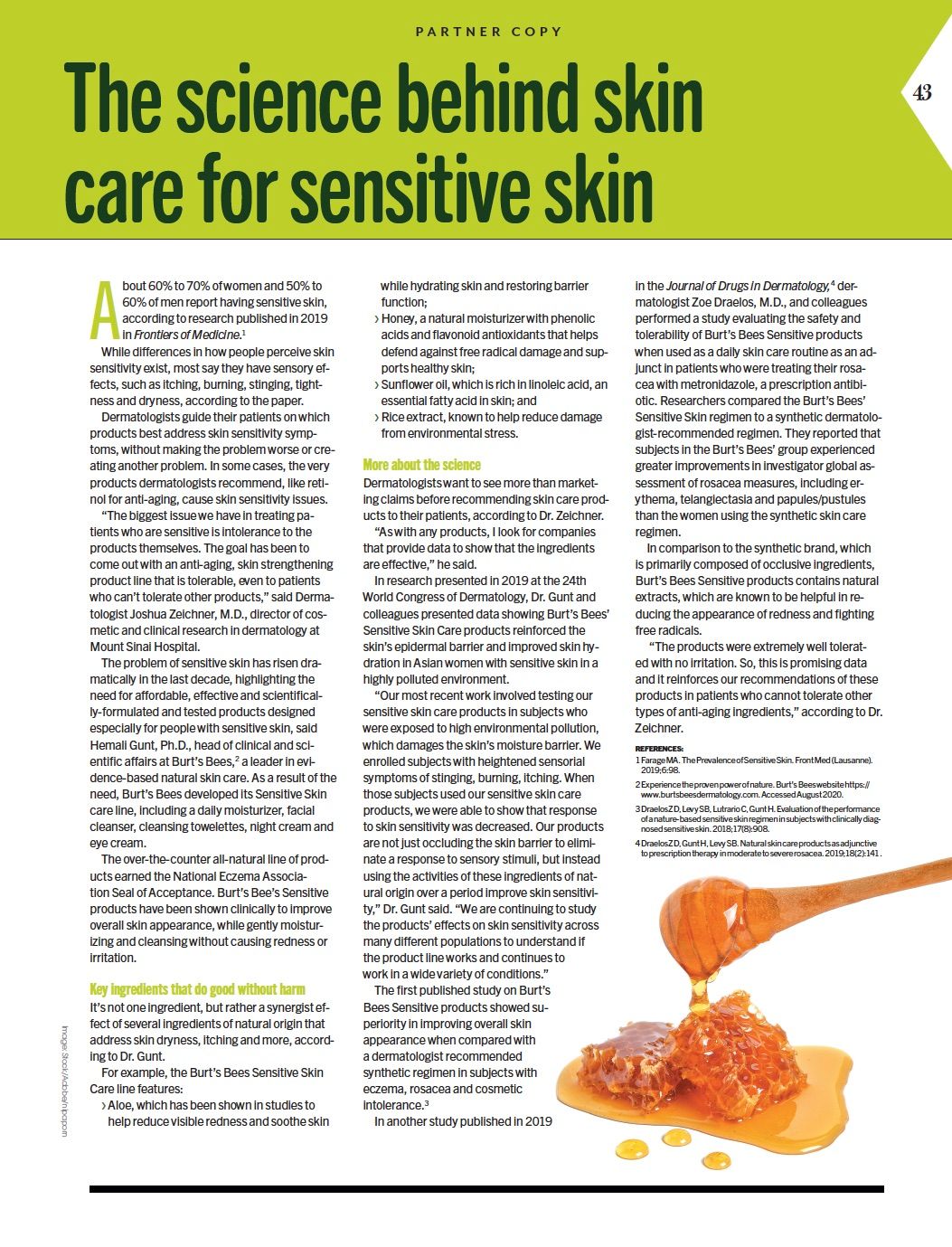- General Dermatology
- Eczema
- Alopecia
- Aesthetics
- Vitiligo
- COVID-19
- Actinic Keratosis
- Precision Medicine and Biologics
- Rare Disease
- Wound Care
- Rosacea
- Psoriasis
- Psoriatic Arthritis
- Atopic Dermatitis
- Melasma
- NP and PA
- Skin Cancer
- Hidradenitis Suppurativa
- Drug Watch
- Pigmentary Disorders
- Acne
- Pediatric Dermatology
- Practice Management
The science behind skin care for sensitive skin
The problem of sensitive skin has risen dramatically in the last decade, highlighting the need for affordable, effective and scientifically-formulated and tested products designed especially for people with sensitive skin.
About 60% to 70% of women and 50% to 60% of men report having sensitive skin, according to research published in 2019 in Frontiers of Medicine.1
While differences in how people perceive skin sensitivity exist, most say they have sensory effects, such as itching, burning, stinging, tightness and dryness, according to the paper.
Dermatologists guide their patients on which products best address skin sensitivity symptoms, without making the problem worse or creating another problem. In some cases, the very products dermatologists recommend, like retinol for anti-aging, cause skin sensitivity issues.
“The biggest issue we have in treating patients who are sensitive is intolerance to the products themselves. The goal has been to come out with an anti-aging, skin strengthening product line that is tolerable, even to patients who can’t tolerate other products,” said Dermatologist Joshua Zeichner, M.D., director of cosmetic and clinical research in dermatology at Mount Sinai Hospital.
The problem of sensitive skin has risen dramatically in the last decade, highlighting the need for affordable, effective and scientifically-formulated and tested products designed especially for people with sensitive skin, said Hemali Gunt, Ph.D., head of clinical and scientific affairs at Burt’s Bees,2 a leader in evidence-based natural skin care. As a result of the need, Burt’s Bees developed its Sensitive Skin care line, including a daily moisturizer, facial cleanser, cleansing towelettes, night cream and eye cream.
The over-the-counter all-natural line of products earned the National Eczema Association Seal of Acceptance. Burt’s Bee’s Sensitive products have been shown clinically to improve overall skin appearance, while gently moisturizing and cleansing without causing redness or irritation.
Key ingredients that do good without harm
It’s not one ingredient, but rather a synergist effect of several ingredients of natural origin that address skin dryness, itching and more, according to Dr. Gunt.
For example, the Burt’s Bees Sensitive Skin Care line features:
- Aloe, which has been shown in studies to help reduce visible redness and soothe skin while hydrating skin and restoring barrier function;
- Honey, a natural moisturizer with phenolic acids and flavonoid antioxidants that helps defend against free radical damage and supports healthy skin;
- Sunflower oil, which is rich in linoleic acid, an essential fatty acid in skin; and
- Rice extract, known to help reduce damage from environmental stress.
More about the science
Dermatologists want to see more than marketing claims before recommending skin care products to their patients, according to Dr. Zeichner.
“As with any products, I look for companies that provide data to show that the ingredients are effective,” he said.
In research presented in 2019 at the 24th World Congress of Dermatology, Dr. Gunt and colleagues presented data showing Burt’s Bees’ Sensitive Skin Care products reinforced the skin’s epidermal barrier and improved skin hydration in Asian women with sensitive skin in a highly polluted environment.
“Our most recent work involved testing our sensitive skin care products in subjects who were exposed to high environmental pollution, which damages the skin’s moisture barrier. We enrolled subjects with heightened sensorial symptoms of stinging, burning, itching. When those subjects used our sensitive skin care products, we were able to show that response to skin sensitivity was decreased. Our products are not just occluding the skin barrier to eliminate a response to sensory stimuli, but instead using the activities of these ingredients of natural origin over a period improve skin sensitivity,” Dr. Gunt said.
“We are continuing to study the products’ effects on skin sensitivity across many different populations to understand if the product line works and continues to work in a wide variety of conditions.”
The first published study on Burt’s Bees Sensitive products showed superiority in improving overall skin appearance when compared with a dermatologist recommended synthetic regimen in subjects with eczema, rosacea and cosmetic intolerance.3
In another study published in 2019 in the Journal of Drugs in Dermatology,4 dermatologist Zoe Draelos, M.D., and colleagues performed a study evaluating the safety and tolerability of Burt’s Bees Sensitive products when used as a daily skin care routine as an adjunct in patients who were treating their rosacea with metronidazole, a prescription antibiotic. Researchers compared the Burt’s Bees’ Sensitive Skin regimen to a synthetic dermatologist-recommended regimen. They reported that subjects in the Burt’s Bees’ group experienced greater improvements in investigator global assessment of rosacea measures, including erythema, telangiectasia and papules/pustules than the women using the synthetic skin care regimen.
In comparison to the synthetic brand, which is primarily composed of occlusive ingredients, Burt’s Bees Sensitive products contains natural extracts, which are known to be helpful in reducing the appearance of redness and fighting free radicals.
“The products were extremely well tolerated with no irritation. So, this is promising data and it reinforces our recommendations of these products in patients who cannot tolerate other types of anti-aging ingredients,” according to Dr. Zeichner.
References:
1. Farage MA. The Prevalence of Sensitive Skin. Front Med (Lausanne). 2019;6:98.
2. Experience the proven power of nature. Burt’s Bees website .https://www.burtsbeesdermatology.com. Accessed August 2020.
3. Draelos ZD, Levy SB, Lutrario C, Gunt H. Evaluation of the performance of a nature-based sensitive skin regimen in subjects with clinically diagnosed sensitive skin. 2018;17(8):908.
4. Draelos ZD, Gunt H, Levy SB. Natural skin care products as adjunctive to prescription therapy in moderate to severe rosacea. 2019;18(2):141 .

